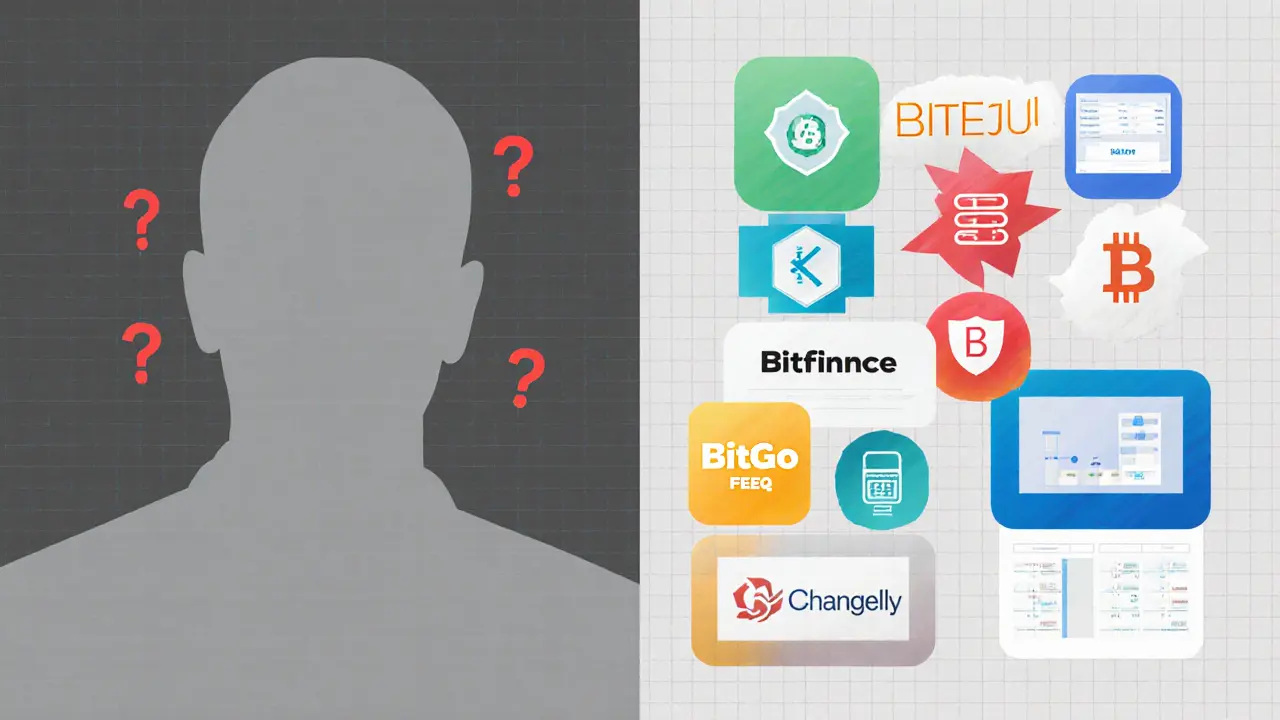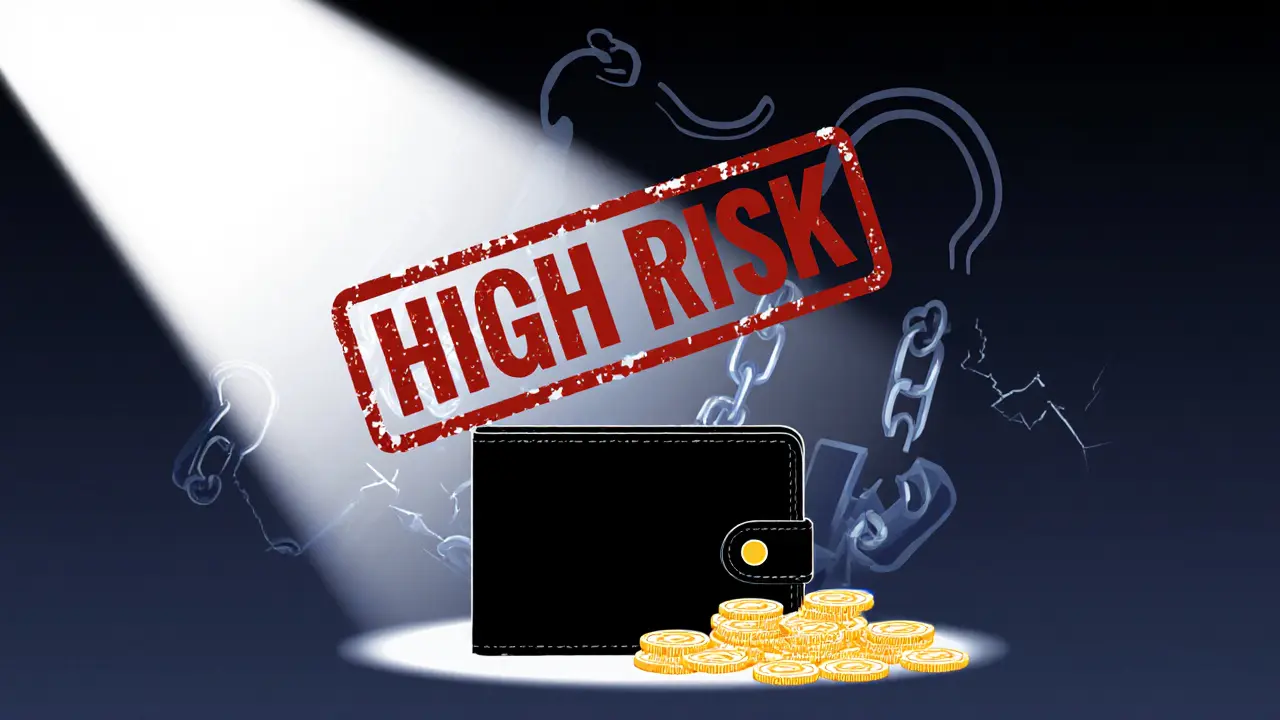Crypto Exchange Safety Checker
When you stumble across a new platform promising low fees and unlimited crypto assets, the first question is always the same: BITEJIU crypto exchange - is it trustworthy or just another trap?
Quick Take
- No verifiable regulatory filings or licensing information on BITEJIU.
- Major data aggregators and news outlets do not list the exchange.
- Red flags include missing fee schedule, opaque ownership, and no independent audits.
- Established exchanges like Binance.US, Bitfinex, BitGo, Bisq and Changelly provide transparent documentation.
- Proceed with extreme caution - treat any funds sent to BITEJIU as high‑risk.
Below we break down how to vet any cryptocurrency exchange, what public records say (or don’t say) about BITEJIU, and how it stacks up against well‑known platforms.
What Makes a Crypto Exchange Credible?
Before diving into the specifics of BITEJIU, it helps to know the baseline criteria most reputable exchanges meet.
- Regulatory registration: A legitimate exchange will list its licensing authority, whether it’s a U.S. state charter, an EU passport, or a licensing regime in places like Seychelles.
- Transparent fee structure: Fees should be broken down per trade, withdrawal, and deposit, with clear percentages or flat rates.
- Proof of reserves: Independent audits or cryptographic proofs that user balances match on‑chain holdings.
- Security practices: Multi‑factor authentication (MFA), cold‑storage ratios, and bug‑bounty programs.
- Customer support: Live chat, email response times, and a public ticket system.
- Reputation metrics: Listings on CoinMarketCap, CoinGecko, or comparable aggregators, plus reviews on Trustpilot and Reddit.
What We Could Find About BITEJIU
Our research started with the usual suspects: the exchange’s official website, regulator databases, and major crypto news portals. The results were starkly empty.
First, the exchange name appears only in a handful of forum posts, many of which warn users about potential scams. There are no entries for BITEJIU in the California Department of Financial Protection and Innovation's Crypto Scam Tracker, a resource that tracks fraudulent platforms targeting U.S. residents. This absence could mean the exchange is brand‑new, region‑locked, or unregistered.
Second, popular data aggregators-Binance.US, Bitfinex, BitGo, Bisq and Changelly-list exhaustive details for each platform, from trading volume to audit reports. BITEJIU is nowhere to be found.
Finally, a simple WHOIS lookup on the alleged domain shows registration under a privacy‑protected service, with no corporate address or phone number. Legitimate exchanges almost always disclose a physical office, even if it’s a virtual headquarters.
Red Flags & Warning Signs
If you’re already on the BITEJIU sign‑up page, keep an eye out for these common scam indicators:
- Requests for unusually large KYC documents (e.g., passport scans plus utility bills with bank statements).
- Promises of “zero‑fee trading” without an explanation of how the platform makes money.
- Pressure tactics like “sign up in the next 10 minutes to lock in the bonus”.
- Absence of a clear privacy policy or terms of service.
- Payment methods limited to non‑reversible channels such as wire transfers or crypto‑only deposits.

How BITEJIU Stacks Up Against Established Exchanges
| Attribute | BITEJIU | Binance.US | Bitfinex | BitGo | Bisq | Changelly |
|---|---|---|---|---|---|---|
| Year launched | Not publicly disclosed | 2019 (U.S. version) | 2012 | 2013 | 2014 | 2015 |
| Regulatory status | Unverified | Registered with NYDFS | Operates under VASP license in several jurisdictions | Licensed custodial provider (multiple jurisdictions) | Decentralized, no central regulator | Unregulated, but compliant with AML in certain regions |
| Custody model | Unknown (no public audit) | Hybrid - hot + cold storage | Hot‑wallet dominant, with cold‑storage vaults | 99.9% cold storage, multi‑signature | User‑holds private keys (non‑custodial) | Non‑custodial instant swaps |
| Typical fees* | Not disclosed | 0.1% maker / 0.1% taker | 0.1% taker, tiered maker fees | 0.05% per transaction (custodial) | No trading fees (network fees only) | 0.5% per swap |
| Known strengths | None verified | High liquidity, regulatory oversight | Deep order book, advanced trading tools | Enterprise‑grade security, API support | Privacy‑first, no custodial risk | Instant conversion, wide token support |
*Fees are listed as quoted by each platform at the time of writing (Oct2025).
Safety Checklist for Any Exchange (Including BITEJIU)
- Verify the exchange’s registration on the financial regulator’s website. Look for a license number.
- Check if the platform publishes a recent third‑party audit or proof‑of‑reserves.
- Test the customer support channel before depositing large sums - a live chat response within minutes is a good sign.
- Start with a tiny amount (e.g., $50) to gauge withdrawal speed and any hidden fees.
- Enable every security feature: MFA, withdrawal whitelist, and email alerts.
- Search community forums (Reddit, BitcoinTalk) for user experiences. Multiple negative reports should raise a red flag.
- If the exchange offers a “bonus” for depositing, read the fine print - many scams tie the bonus to impossible referral thresholds.
Should You Use BITEJIU?
Based on the data (or lack thereof) we have, the safest answer is “no, unless you can verify the exchange yourself.” The crypto world is littered with platforms that vanished overnight, taking user funds with them. Until BITEJIU publishes a verifiable audit, a clear regulatory license, and a transparent fee schedule, the risk outweighs any potential benefit.
What to Do If You’ve Already Sent Money to BITEJIU
If you’ve deposited crypto or fiat into an account that now looks suspicious, follow these steps quickly:
- Document every transaction: screenshots, wallet addresses, timestamps.
- File a report with your local financial regulator - in NewZealand, that’s the Financial Markets Authority.
- Submit a complaint to the Crypto Scam Tracker maintained by the California Department of Financial Protection and Innovation, even if you’re outside the U.S.; the database is public and helps investigators.
- Notify your wallet provider or exchange (if you transferred from another platform) - they may be able to freeze outgoing addresses.
- Consider posting in reputable crypto community boards to warn others and gather any additional intel.
Bottom Line
Crypto offers amazing opportunities, but it also attracts fraudsters. A thorough vetting process is non‑negotiable. Since BITEJIU fails every basic criterion - no licensing info, no public audit, no presence on trusted aggregators - treat it as high‑risk. Stick with exchanges that openly share their compliance documents, have a track record, and are listed on major market data sites.

Frequently Asked Questions
Is BITEJIU a legitimate crypto exchange?
There is no verifiable licensing, audit, or public data confirming BITEJIU’s legitimacy. Until such information surfaces, it should be considered unverified and potentially unsafe.
How can I check if a crypto exchange is regulated?
Visit the regulator’s official website (e.g., NYDFS, FCA, or NewZealand’s Financial Markets Authority) and search for the exchange’s license number. Reputable platforms always display this information prominently.
What does “proof of reserves” mean?
Proof of reserves is an independent verification that the exchange’s on‑chain holdings match the total user balances it reports. It often uses cryptographic Merkle trees or third‑party audit reports.
Can I recover funds if I sent them to a scam exchange?
Recovery is rare. The best chance is to act fast: report to your local regulator, inform any upstream exchange, and file a complaint with scam‑tracking agencies. Most fraudsters move the money off‑chain quickly.
What are the safest alternatives to BITEJIU?
Platforms such as Binance.US, Bitfinex, BitGo, Bisq, and Changelly meet most credibility checkpoints: clear licensing, audited security practices, and transparent fee schedules.


Author
Ronan Caverly
I'm a blockchain analyst and market strategist bridging crypto and equities. I research protocols, decode tokenomics, and track exchange flows to spot risk and opportunity. I invest privately and advise fintech teams on go-to-market and compliance-aware growth. I also publish weekly insights to help retail and funds navigate digital asset cycles.